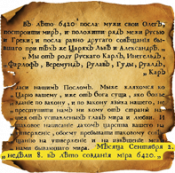
Anniversary of conclusion of Russian-Byzantine Treaty – one of the first diplomatic acts of Rus’
September 2, 911 was signed the Russian-Byzantine treaty - one of the first diplomatic acts of ancient Russia.
The treaty was signed after a successful campaign of Prince Oleg’s armed force against Byzantium. It continued further regulation of Russian-Byzantium relations stipulated by the treaty of 907.
General Policy of the Russian-Byzantine Treaty of 911 repeated the provisions of 860 and 907 agreements. The text of the Treaty was preceded by a chronicle record, which stated that Prince Oleg sent his men to conclude peace between Russia and Byzantium.
Clauses of the Russian-Byzantine Treaty 911 covered the ways of consideration of various crimes and punishments for them; the responsibility for murder; on liability for intentional assault or theft, and the corresponding penalties for it; the responsibility for the robbery; the order of assistance to merchants of both countries during their voyage with goods; the order of redemption of prisoners; the assistance to Greeks on the part of Russia and the order of service of Russians in the Imperial Army; the practice of redemption of any other prisoners; on the order of return of servants who ran away or were kidnapped; the practice of inheritance of property of Russians who died in Byzantium; on the order of Russian trade in Byzantium; the responsibility for the debt and the punishment for failure to pay the debt.
Unlike previous treaties, where the content was brought to the attention as the "emperor's award" to Russian prince, this treaty was equal in rights between two equal parties of the negotiation process. Most of the articles of the Treaty was of a two-way nature: both sides should keep "peace and love", both Russians and Greeks were responsible for crime, etc. That was a big diplomatic victory of the young Russian state.
The Treaty was drawn up in two identical copies in Greek and Russian languages. But in the Russian text the Greeks were addressed on behalf of the Russian Grand Duke, his princes and boyars, and in Greek - on behalf of the Byzantine emperors and the "all Greeks." The two parties exchanged the deeds: Russians received the Greek text, and Greeks – the Russian copy. But each party had kept a copy of its own text, which was given to the other side. Subsequently, the Greek original and the Russian copy were lost; 911 treaty and other relevant documents are preserved in the Primary Chronicle.
Before leaving home Russian envoys were received by the Emperor Leo VI, who presented them with expensive gifts of gold, silks, precious vessels, and then asked his "men" to demonstrate "the beauty of the church and the chambers of gold” and then let them go "to their land with a great honor." In Kiev, the embassy was ceremonially received by the prince Oleg. The envoys reported on the progress of negotiations, on the content of the new treaty and “how the peace was established between Greece and the Russian land ...»
Lit.: Бибиков М. В. Русь в Византийской дипломатии: Договоры Руси с греками X в. // Древняя Русь. Вопросы медиевистики. 2005. № 1 (19). С. 5-15; То же [Электронный ресурс]. URL: http://www.drevnyaya.ru/vyp/stat/s1_19_1.pdf; Пашуто В. Т., Внешняя политика Древней Руси, М., 1968; Памятники русского права. Вып. 1. М., 1952; Повесть временных лет. Ч. 1—2, М.; Л., 1950; Сахаров А. Н. Дипломатия Древней Руси. М., 1987.
Based on the Presidential Library’s materials:
Барац Г. М. Критико-сравнительный анализ договоров Руси с Византией. Киев, 1910;
Лавровский Н. А. О византийском элементе в языке договоров русских с греками. СПб., 1853;
Лонгинов А. В. Мирные договоры русских с греками, заключённые в X веке. Одесса, 1904;
Лопарев Х. М. Греки и Русь. СПб., 1898;
Сокольский В. В. О договорах русских с греками. Б. м., 1870;

